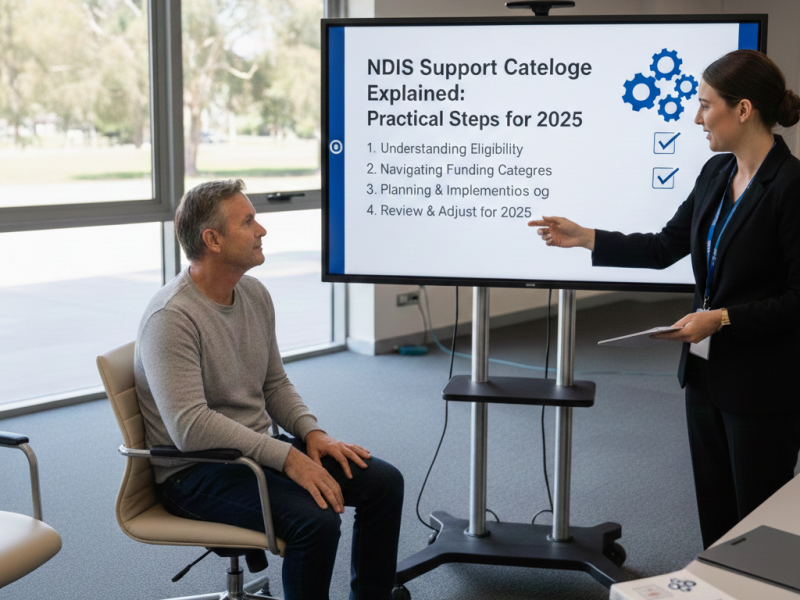For NDIS Providers, detailed NDIS policies and procedures are not just best practice. They are a mandatory requirement under the NDIS Practice Standards. These documents form the foundation of a Provider’s compliance framework, clearly demonstrating how services are delivered, risks managed, Participants supported, and rights upheld.
NDIS policies and procedures must cover all aspects of service delivery, from Participant intake and support planning to incident response and organisational governance. When tailored correctly, they help Providers achieve audit success, maintain consistency across teams, and build trust with Participants and their families.
Whether you are a new Provider preparing for initial registration or an existing Provider undergoing mid-term audit or renewal, it is essential to ensure your policies are compliant with current legislation, embedded into everyday practice, and understood by your workforce. With the NDIS landscape regularly evolving, outdated documentation can expose your business to audit failures and service delivery risks.
Want to Attract More NDIS Clients?
Get expert advice on how to market your services, connect with clients, and grow your practice.
Comprehensive Policy Suite
A fully developed NDIS policy suite is a Provider’s best defence against non-compliance. This library is more than a collection of templates. It should be unique to reflect your organisation’s size, structure, services, and risk profile. NDIS Practice Standards require that each policy has a matching procedure that explains who does what, when, and how compliance is ensured.
Core policy areas typically include:
- Governance and Operations: Describing leadership responsibilities, financial systems, and continuous improvement.
- Participant Rights and Safeguards: Addressing privacy, consent, complaints handling, and protections against abuse and neglect.
- Service Delivery: Outlining processes for intake, risk assessment, service agreements, goal planning, and service reviews.
- Workforce and HR: Encompassing recruitment, screening, induction, training, performance management, and supervision.
- Incident Management: Explaining how Providers detect, respond to, and report incidents in line with the NDIS (Incident Management and Reportable Incidents) Rules.
- Work Health and Safety: Identifying obligations to provide a safe and healthy environment for both staff and Participants.
Together, a well functioning document suite enables Providers with the structure to run a compliant, ethical, and Participant-first NDIS support service.
Customisation and Support Services
NDIS Policies must reflect the actual practices, risks, and supports of each unique Provider. Off-the-shelf generic templates, that are not tailored to your service model or workforce, are unlikely to meet Audit standards.
Compliance consultants offer tailored documentation and policy development services based on your organisation’s registration groups, state legislation, and support types. These services often include:
- Consultations to understand your operating model and risks
- Customised content aligned to your supports and service model
- Compliance with Verification, Core and Supplementary Module NDIS Practice Standards
- Integration of state legislation and sector best practices
Many Providers also receive ongoing compliance support, with regular policy updates and access to electronic document management systems. These tools help organisations store, monitor, and update their policies with ease.
Outsourcing the customisation of policies can reduce time and stress for new Providers approaching their first audit. For Registered Providers, they are critical for maintaining compliance during mid-term and recertification audits.
Key Policy Categories
Understanding which NDIS policies and procedures are critical to your registration is key. The NDIS Commission expects evidence in the following five categories.
- Governance and Risk Management: This includes strategic planning, risk mitigation, improvement systems, and incident response protocols. These documents reflect your commitment to leadership, safety, and accountability.
- Participant Safety and Rights: This area covers advocacy, informed consent, protection of vulnerable Participants, privacy, and complaints handling. These policies support compliance with the NDIS Code of Conduct and help uphold Participant rights.
- Service Delivery: These policies guide how supports are planned, delivered, monitored, and reviewed. They include Participant intake and exit procedures, care planning, and service agreements.
- Workforce Management: Policies in this category focus on recruitment, induction, staff training, conduct management, and performance supervision. They ensure that all staff meet NDIS screening and suitability standards.
- Work Health and Safety: These policies ensure a safe environment for staff and Participants. They address hazard identification, emergency management, safe work procedures, and support for staff mental health and wellbeing.
Recent Updates and Practice Standards
The NDIS is a dynamic environment, with frequent changes to rules, pricing, and practice expectations. Recent updates have focused on:
- Stronger protections for Participants with complex needs
- Increased accountability in the use of restrictive practices
- New screening and training requirements for workers
- Pricing Guide changes that impact service delivery and billing
Providers must regularly review their policies to reflect these changes. Outdated documentation can result in non-compliance, corrective actions, or deregistration. To stay current, Providers should subscribe to NDIS Commission alerts, participate in webinars, or work with compliance specialists who provide policy review services.
Having the right policies in place ensures you are not left guessing when audit time comes around. High-quality, up-to-date procedures are more than a formality. They are the foundation for safe, consistent, and Participant-centred service delivery. Maintaining policies in line with current requirements is a key part of ethical, high-quality, Participant-focused service delivery.
Referrals Start With Reputation – We’ll Help You Build Both
From networking tips to service refinement, we guide NDIS providers toward lasting impact.
Contact Information and Enquiries
If you are an NDIS Provider needing help with policies and procedures, support is readily available. Whether you are registering for the first time, preparing for audit, or checking your documents, compliance consultants can assist.
Look for Providers who offer:
- Fully customised NDIS policy and procedure documentation
- Support with audit readiness and self-assessments
- Staff training tools and policy implementation guidance
To enquire:
- Phone: Call a compliance support team for advice
- Email: Send your organisation details for a policy review
- Consultation: Book a free 15 to 30-minute consultation to check your documentation status
FAQs
1. What are the key categories of NDIS policies that Providers should be aware of?
NDIS Providers must have policies across five critical areas: governance and risk management, Participant safety and rights, service delivery, workforce management, and WHS. These categories are aligned with the NDIS Practice Standards and are essential for delivering ethical, Participant-focused supports. Each policy must reflect the size, structure, and services of the Provider to ensure audit readiness.
2. How often should NDIS policies be updated, and how can Providers stay informed?
NDIS policies should be reviewed at least once a year or when there are changes to the NDIS Practice Standards, legislation, or internal procedures. Providers can stay updated by subscribing to alerts from the NDIS Quality and Safeguards Commission, attending sector webinars, and working with compliance consultants who offer regular policy reviews. Staying current is essential for continuous compliance and audit success.
3. What support is available for NDIS audit readiness?
Audit support services include customised policy development, document reviews, mock audits, and compliance advice. Consultants such as Avaana offer expert guidance tailored to registration, mid-term, and recertification audits to help Providers avoid delays, meet regulatory obligations, and maintain a compliant, high-quality service environment.


